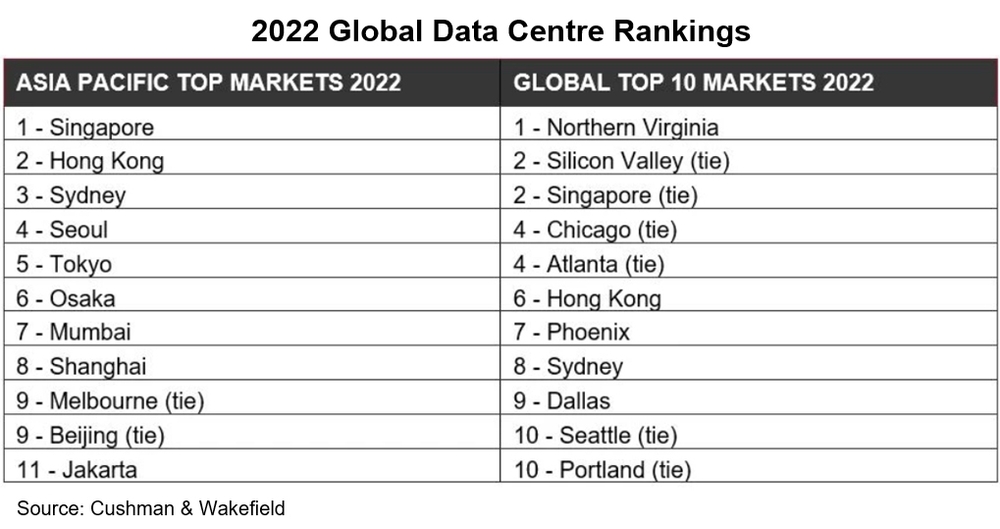The Road to Net Zero: Delivering a Sustainable Data Centre Future
The rapid progress of digital transformation during the Covid-19 pandemic has set the agenda for businesses looking to become future players in a hyperconnected ecosystem. Data, generated from every interaction, has never been more important in terms of planning and goal‑setting, benchmarking, evaluation and assessment.

Charles Lee, founder and CEO of OneAsia Network Limited.
Data centres have therefore become an increasingly essential piece of infrastructure, supporting data‑dependent sectors like financial services, trading and logistics. They also provide the catalyst for the development of new content and applications under the Web3 development, and the application of technologies such as blockchains and metaverse, and cloud computing services.
Secure, high‑performance data centre services are crucial for their operation and continuous growth. With an exponential increase in online data and the advent of cloud computing and the metaverse, the demand for data centre facilities and services is surging, creating tremendous opportunities for the data centre sector.
There is the potential for strong growth in the demand for data centres in Hong Kong. This is thanks to its robust telecommunications infrastructure, its reliable power supply with comparatively low tariffs, its pro‑business environment, its proximity to the mainland China market, its effective protection of data privacy and information security, its supply of knowledgeable professionals and, in addition to all this, government support.
To discover more about how the data centre industry has been mushrooming in Hong Kong, Louis Chan, Principal Economist (Global Research) at HKTDC, interviewed Charles Lee, Chairman of the Hong Kong Data Centre Association and founder and CEO of OneAsia Network Limited.
Chan: How has Hong Kong been doing in terms of data centre development in recent years, especially given the moves the Hong Kong government has made to accommodate data centres? How has this development been affected by the Covid-19 pandemic?
Lee: The robust development of technology and telecommunications has caused an unprecedented rise in demand for data centres. The volume of data flow across the world increased exponentially by 29.5 times in the 2010‑2020 decade, and will more than double between 2020 and 2024.
As a major financial and international trading and logistics hub and home to the regional offices and headquarters of many global corporations, Hong Kong is the second biggest data centre market in the Asia Pacific region [1] and the sixth biggest in the world. The number of operators in Hong Kong has grown from 17 in 2012 to 37 in 2020. This is also due to the substantial investment made in both infrastructure (hardware and capacity building) and software (new technologies).
Business tends to locate where the market is and so do data centres. The unrivalled connection Hong Kong has with mainland GBA cities creates substantial demand for data centre services of high security and serviceability. This provides Hong Kong data centre operators with unparalleled opportunities to grow – in particular in the areas of cloud computing, e‑business, Internet of Things (IoT) and logistics – alongside the internationalisation of mainland China’s service industries, including the information industry.
The gross floor area used for data centres doubled between 2015 and 2022 to reach 11m sq. feet. The Hong Kong data centre market continues to see enormous investment growth, reaching US$30.7bn in 2022, a figure nearly six times higher than five years before. Further growth of 14% is expected between now and 2027.
Up‑and‑coming: Hong Kong adds new data centre locations in Tuen Mun, Tsing Yi, Lantau Island and Lok Ma Chau. Source: OneAsia Network Limited
There are many drivers behind the growth in Hong Kong’s data centre sector – such as its robust telecommunications infrastructure (with nine satellites, 12 submarine fibre cable systems providing about 90 terabits per second in capacity and 20 overland optical fibre cable systems, supporting 5G coverage for more than 90% of the population). Then there is the excellent water and power supplies (with a reliability level exceeding 99.999%) which reduce the risks of data loss and infrastructure damage, the city’s favourable micro‑climate and geographical location immune from natural disasters, its free flow of information with no censorship of content and adequate protection of data privacy, and its strong R&D capability linked to its famous universities. Furthermore, it has a pro‑business environment with strong government policies, supporting data centre investors and operators by converting existing industrial buildings, sourcing land from greenfield sites, drawing up territory‑wide cavern development plans, and purchasing or renting commercial sites in the open market.
All of this has been a shot in the arm for the city’s data centre market. For instance, the reactivation of the Revitalisation of Industrial Buildings Scheme announced in the 2018 Policy Address has released plenty of spaces for industries such as data centres. And the synergy between the upcoming San Tin/Lok Ma Chau Development Node, in which 57 of its 320 hectares will be allocated to Enterprise and Technology Park, and the proposed Hong Kong-Shenzhen Innovation and Technology Park (HSITP), which boasts a gross floor area of 1.2m sq. metres, will quicken the pace of the city’s I&T development.
In addition to helping increase the supply of land available, the HKSAR Government is also committed to making Hong Kong a prime location for data centres in the Asia Pacific by introducing and implementing a number of measures to facilitate this. These include the establishment of the Data Centre Facilitation Unit under the Office of the Government Chief Information Officer (OGCIO) in July 2011, which will provide one‑stop support to overseas and local enterprises interested in setting up data centres in Hong Kong. It liaises with government departments on matters such as statutory processes and compliance requirements.
Covid-19 has triggered an acceleration in digitalisation at individual, corporate and national levels, which has put network and telecommunications reliability into the spotlight. Social distancing and nationwide lockdowns have driven the increased use of digital technologies. As a result, data centres have become the backbone of the 85% of Hong Kong enterprises using cloud computing to thrive during the pandemic.
From a city’s perspective, any smart initiative that depends on open, scalable, and cross‑sectional systems to promote the application of artificial intelligence (AI), big data analysis and real‑time, cloud‑ready services, needs its data storage capacity to be resilient. This gives the network and telecommunications infrastructure a great incentive to scale up with better disaster recovery and backup solutions to strengthen its availability and integrity.












